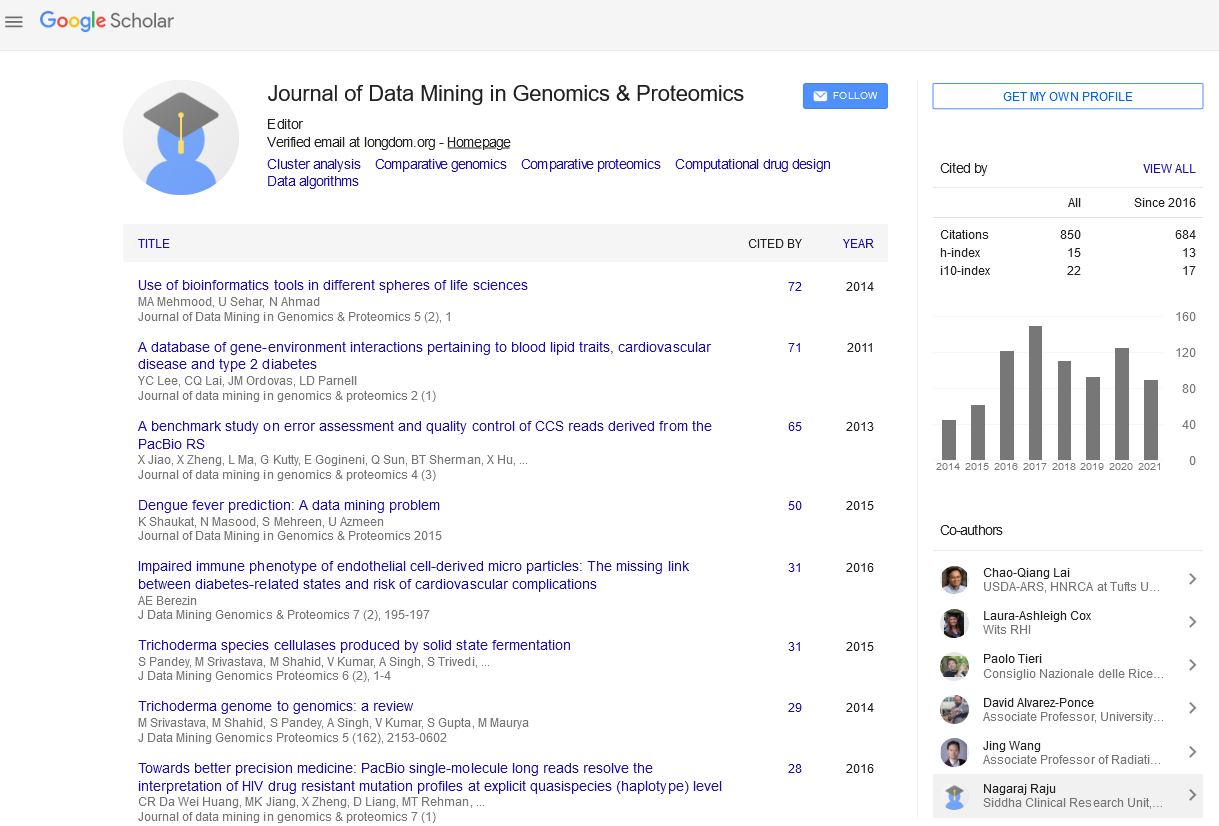PMC/PubMed Indexed Articles
Indexed In
- Academic Journals Database
- Open J Gate
- Genamics JournalSeek
- JournalTOCs
- ResearchBible
- Ulrich's Periodicals Directory
- Electronic Journals Library
- RefSeek
- Hamdard University
- EBSCO A-Z
- OCLC- WorldCat
- Scholarsteer
- SWB online catalog
- Virtual Library of Biology (vifabio)
- Publons
- MIAR
- Geneva Foundation for Medical Education and Research
- Euro Pub
- Google Scholar
Useful Links
Share This Page
Journal Flyer

Open Access Journals
- Agri and Aquaculture
- Biochemistry
- Bioinformatics & Systems Biology
- Business & Management
- Chemistry
- Clinical Sciences
- Engineering
- Food & Nutrition
- General Science
- Genetics & Molecular Biology
- Immunology & Microbiology
- Medical Sciences
- Neuroscience & Psychology
- Nursing & Health Care
- Pharmaceutical Sciences
Bioinformatics for mining the data from next generation biotechnology platforms
Ramana V Davuluri
: J Data Mining in Genom Proteomics
Abstract:
Biomedical research is undergoing a revolution, rapidly changing from the previous model of an individual research group tackling one discrete problem focusing on one gene, protein, or pathway, to larger-scale, interdisciplinary team science. These collaborations typically use advanced computational strategies to analyze, integrate, and model large, complex datasets produced by genomics and proteomics [1]. New computational technologies and data storage devices now permit scientists to approach problems that previously were nearly incomprehensible, such as identifying the complex patterns and cellular networks involved in tumor progression and resistance to therapy. Moreover, computational sciences are essential for biomedical researchers to exploit the full potential of genomics and proteomics to: discovery and validation of novel prognostic and Pharmacodynamic biomarkers, characterize other diseases, understand complex biological regulatory systems, and solve complex molecular structures. As a result, systems biology is playing an important and increasing role in modern biomedical research. Working across multiple disciplines, we are developing bioinformatics methods and software for integrating research data in disparate fields toward the common goal of understanding the mechanisms of cancer and other diseases. Our group develops bioinformatics tools and computational models for: (1) Genomewide discovery of alternative promoters in human and mouse genomes, (2) Modeling aberrant usage of alternative promoters in cancer genomes, and (3) Modeling the epigenetic modifications in the promoter regions in cancer genomes. I will discuss these bioinformatics tools, some are recently published [2-7] and some are in development [8].
Biography :
Dr. Davuluri completed his Ph.D in Statistics from Indian Agricultural Statistics Research Institute, New Delhi and Postdoctoral Studies in Bioinformatics from Cold Spring Harbor Laboratory, New York, USA. He is the director of computational biology and holds Philadelphia Healthcare Trust Professorship in the Center for Systems and Computational Biology, The Wistar Institute, Philadelphia, USA. He earlier worked as tenured-associate professor and head of bioinformatics, Human Cancer Genetics program, The Ohio State University Comprehensive Cancer Center, Columbus, OH, USA. He has published more than 65 papers in reputed journals and serving as an editorial board member of repute, e.g. Cancer Research.


